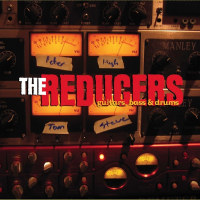 Silvery -- Thunderer & Excelsior (Blowup)
Silvery -- Thunderer & Excelsior (Blowup)This is caffeinated pop of the highest order. Silvery comes from the same place as bands such as Sparks (who they have cited as an influence), Roxy Music, Split Enz (during the Phil Judd era), Cardiacs, Supergrass, The New Pornographers and The Features. This is rock and roll sent careening through the funhouse, with plenty of energy and some distortions, which manages to stay intact due to strong compositions and a bevy of hooks.
The album plays somewhat like an A-sides/B-sides compilation, and, indeed, the band’s terrific singles lead off the disc and the tail end of the album shows that they can handle more than 2:30 bursts of excitement.
The album gets off to a cracking good start on "Horrors". The keyboards dominate on a song that sounds like a collaboration between Gaz Coombes of Supergrass and Pete Shelley of Buzzcocks. The song has two distinct melodies and goes from verse to chorus (and thus, the hook) speedily.
Next up is "Devil in the Details", with a rising and falling melody, and singer James Orman quivering and going up in his range while keyboardist Simon Harris mixes church-style organ with horror movie sounds. This song has about four separate parts to it and the arrangement is clever as there is so much going on in the mix. And the hook is, again, indelible.
The band then moves into punchy Maximo Park territory on "Action Force". Here, the tinkling ivories contrast with Orman’s dirty sounding guitar. Things finally slow down a bit on "Penny Dreadful". The opening riff is a two-chord wonder, a la Sparks’ "I Predict", with the song opening up into a whirligig chorus that reeks of Split Enz.
These songs alone guarantee a good album. But there are more treats further down the road. "The Nishikado" turns one of my favorite tricks, resolving a somewhat dissonant verse with a rambunctious sing-a-long chorus. Well, sing-a-long if you can make out all of the words.
On "Star of the Sea", Silvery adds a ska beat to the proceedings, but only for a while. This is a mini-epic, with changing tempos and multiple parts. The journey culminates in a rousing ending, making the build up pay off.
I wish I could make out a bit more of the lyrics, which I only catch in a snatch here or there. The best songs have at least one memorable turn of phrase. But it’s the form that wins out over the substance. Silvery has a sound that is evocative of some of favorite pop music ever. And the songs have stuck in my head from pretty much the time I first listened to the disc. If the comparisons I made at the beginning strike a chord in you, you really should check this out.














